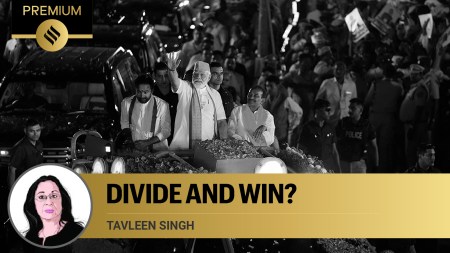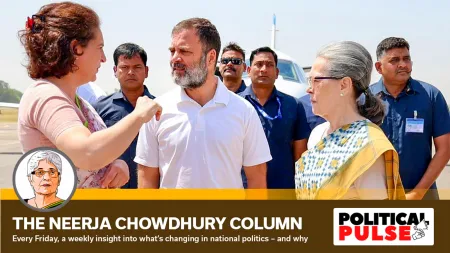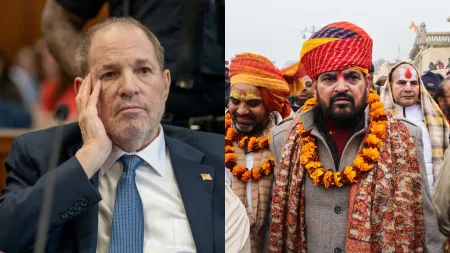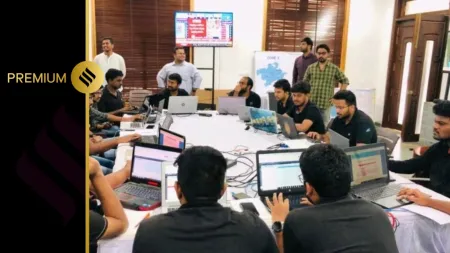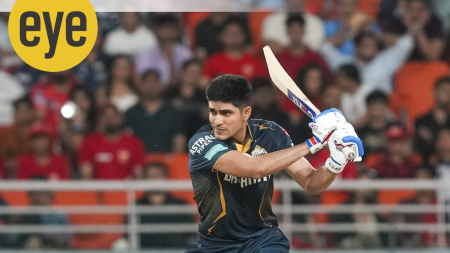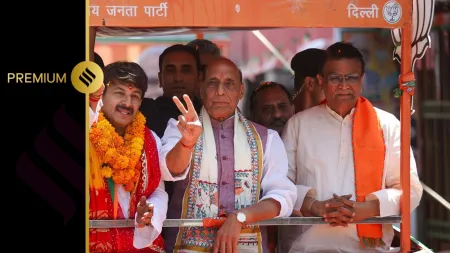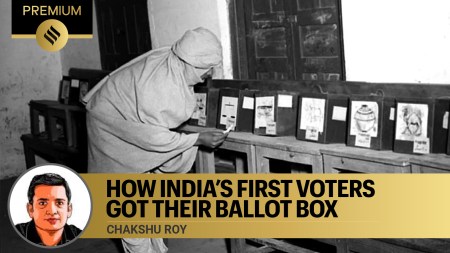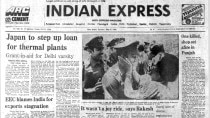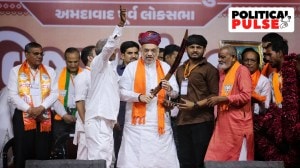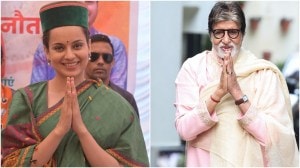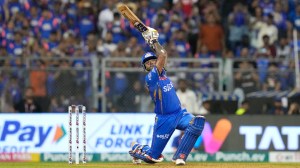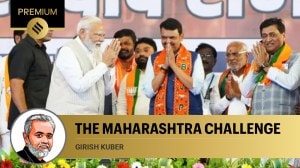- India
- International
After Burhan Wani’s killing, an illusion is shattered in Kashmir
How does one address words to Kashmir? What do you say in a political context where all texts are sub texts, all ends dead ends?
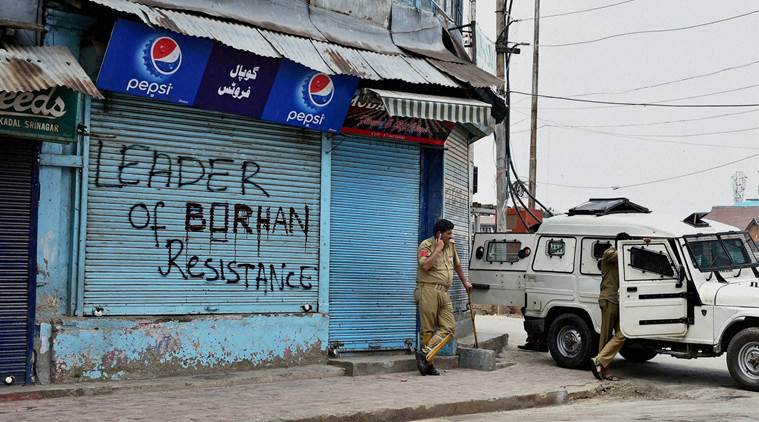 Srinagar: Policemen guard a street during restriction and strike on fourth consecutive day in Srinagar. (PTI photo)
Srinagar: Policemen guard a street during restriction and strike on fourth consecutive day in Srinagar. (PTI photo)
Kashmir evokes, above all else, an overpowering and numbing sense of futility. When “heaven is on fire”, to use Muzamil Jaleel’s evocative phrase, it is not clear to whom words are addressed. How can one address words to the Indian state that has repeatedly produced outcomes of the kind we have just witnessed since Burhan Wani’s killing: Thirty-one young people killed, scores injured, many blinded? What does one say to this state that has, whatever the formal legalities and mitigating circumstances of the case may be, acted as an occupying army, immobilising considerations of justice at every turn? What does one say to its custodians, who at this point, mouth platitudes about their resolve over Kashmir, more I think to convince themselves, than to address Kashmiris? What does one say to this state that refuses to see the problem for what it is: A deep legitimacy crisis of the Indian state and a standing rebuke to Indian democracy? This state will, doubtless, be able to curb the violence in a few days: We will again feign normalcy, till the next round takes us by predictable surprise.
We will unleash our rhetorical prowess on Pakistan; stand firm in our resolve to fight terror. All well and good and justified. But let no one underestimate what has been on display in Kashmir since the killing of Burhan Wani: In one fell swoop the legitimacy of the Indian state has been eroded. The comforting illusion that all we face is a cross-border intervention, not the deep and continual alienation of our own citizens, has been shattered. The response will alas be predictable: First the law and order solution and then some promise of good governance. The latter could be a start, but that promise has been betrayed so many times that one cannot make it with a straight face. And these instruments have not been enough to break the vicious cycle of distrust. The structure of competitive politics will, in the end, be too preoccupied with competitive bickering.
Full coverage: Protests in Kashmir following death of Burhan Wani
But it is a fatal mistake to assume that there is just an instrumental solution to this challenge. The small windows of relative normalcy, the inevitable desire of so many young Kashmiris to make their way in the world has always lulled us into a sense of complacency. The sense in Kashmir that the idea of India is not a beacon of light and hope, but an ever strengthening shadow of darkness and violence, of disappearances and denial, of betrayal and repression, is strong. One measure of this is that it is hard to think of an Indian state that has produced such a poetry of pain (but then in these times of prose, who reads poetry). As the shadow of majoritarianism increases, this credibility crisis of the state will worsen. But how can one say this to a state where even an attempt at the description of the problem will be met with the usual ideological barrage: Insinuations of romanticising separatism and much worse. There is nothing in the ideological and empathetic armoury of the Indian state that is geared to addressing the deep alienation of those who matter in Kashmir. It is designed mainly to address Indians in the rest of India, so that we give our state a long leash in Kashmir.
WATCH VIDEO: Kashmir Protests: Visuals Of Curfew In the State

I must confess that I am surprised that we are constantly surprised that teenagers in Kashmir are throwing stones at the Indian state. The real surprise is that it does not happen more. If we were subject to the regular interdictions of the police most of us might be tempted to pick up a stone or two; what years of army occupation, no matter how well intentioned and well run, would do is anybody’s guess. Our insecurities have produced a failure of empathetic imagination on our part, we want to hide behind a cloak of monumental ideology that mutilates any conversation about what it is really like to live in a state of siege. But I am also surprised at the surprise that a terrorist like Burhan Wani can be made a martyr by the general public. It is important to remember that this is not a phenomenon unique to Kashmir. It is still hard to dissociate far graver acts of terrorism, the assassinations of Indira Gandhi and Rajiv Gandhi, from the construction of ethnic identity and politics in Punjab and Tamil Nadu respectively. This political phenomenon needs deeper diagnosis.
Column | Mirwaiz Umar Farooq writes: A new generation of struggle
But how does one address words to Kashmir? What do you say in a political context where all texts are sub texts, all ends dead ends? Writers like Chetan Bhagat are more confident of their locus standi in addressing Kashmiri youth. Given what we know about our state, I am less confident that we can look them in the eye and make even a credible promise let alone redeem the pain of the past. All we can do is try and make this India, in whose name we licence violence, attractive and credible enough. Just as we hope that the Indian state will make truth not illusion the starting point of its strategy; we hope Kashmir politics will do the same. The path of violent state subverting terrorism, just as a matter of political reality, has almost never led to success.
WATCH VIDEO: Kashmir Protests Victim: 5-Year Old Zohra On How She Got Hit
Whatever romanticism there was about the idea of Kashmiriyat, it is now tinged with the irrevocable odour of ethnic cleansing and reactionary radicalism. The Indian state, with its size and might, will probably absorb the cost of this turn. But in the end, the price of that violence and turn to reactionary radicalism will be most deeply felt by Kashmiris. One can easily grant the mutilations inflicted by the Indian state; but these do not have to be compounded by a kind of self-mutilation that violent terrorism by its nature brings. It may seem cathartic for a while, but this path hardly contains the seeds of regeneration. We can all remind ourselves of Sheikh Abdullah’s insight: That the fate of Kashmir inevitably depends upon the fate of India-Pakistan relations.
A transformation in that relationship opens up options; hostility in that relationship diminishes possibilities. It is easy to propose interim steps in Kashmir. But as Vajpayee used to ask, “yeh sab karega kaun?” No political force is minimally up to the task. The crisis will deepen as this episode puts a strain on the PDP-BJP alliance. All we can hope for is that politics throws enough cold water on the heaven that is on fire. But the sense of foreboding is only growing.
(This article first appeared in the print edition under the headline ‘Heaven on fire’)
40 Years Ago
EXPRESS OPINION
More Explained
May 06: Latest News
- 01
- 02
- 03
- 04
- 05


